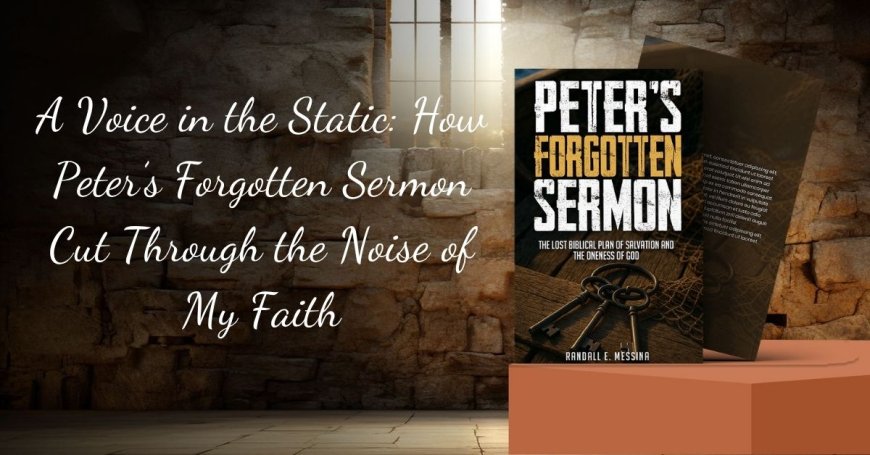A Voice in the Static: How Peter’s Forgotten Sermon Cut Through the Noise of My Faith

Ill be honest, my faith has gotten noisy. Somewhere along the way, it became a collage of podcasts, streaming sermons, theological debates on Twitter, and well-meaning reels of preachers saying mostly the same thing in slightly different fonts. I dont think I noticed it happening. It was like living next to a train track. Eventually, you stop hearing it. But the noise is still there, humming in the background.
Thats why Peters Forgotten Sermon felt like static clearing.
Randall E. Messina doesnt enter the scene like a new influencer or spiritual guru. Theres no branding polish, no ten-point checklist to spiritual wholeness. What he offers instead is almost jarringly simple: a return. Not to tradition, not to church politics, not even to some imagined golden age of Christianity, but to a single moment. A sermon, really. A real one, from Peter, standing in Jerusalem with a crowd staring back at him after the Holy Spirit had descended like fire.
Acts 2:38. Youve probably heard it. I had. But I hadnt heard it.
Repent, and be baptized every one of you in the name of Jesus Christ for the remission of sins, and ye shall receive the gift of the Holy Ghost.
The words are blunt. Messy. Beautifully inconvenient. And in Messinas book, theyre not just scriptural ornament, theyre a challenge. What if this verse is the framework for salvation, not just a line in a larger narrative? What if Peter wasnt improvising, but delivering a divine blueprint?
Messinas book doesnt read like a theological manifesto. It reads more like a letter, written late at night, maybe, by someone whos done more weeping than preaching. It has the cadence of a man whos been holding something in for years and finally found the nerve to say it out loud. And what hes saying, if you really listen, is that many of us have been sold a version of the gospel that never required real surrender. One that substitutes belief for rebirth. One that doesnt hurt enough to heal.
I didnt want to believe he was talking to me. Ive been a Christian for most of my life. I know the verses, the structure, and the flow of worship services. Ive cried at youth camps and rededicated my life more times than I can count. But there was something about the way Messina described receiving the Holy Spirit that exposed a hollowness Id been avoiding. Not because Id never felt Gods presence. But because Id stopped expecting it to undo me.
Theres a section in the book where Messina recounts people encountering the Spirit, not with soft lighting and ambient music, but with tears, trembling, and real emotional upheaval. Not chaos, but clarity. Not performance, but presence. It sounded raw. It sounded... true, not like something youd orchestrate in a service, but something that would happen in spite of one.
Reading it, I felt embarrassed by how often Ive settled for a numb faith. How often Ive interpreted silence as absence, instead of invitation.
I think thats what surprised me most about the book. It didnt make me feel guilty. It made me feel called. Called back to something I may never have fully understood, even if I could quote it.
And then theres the Oneness theology. Messina doesnt tiptoe around it. He challenges the traditional doctrine of the Trinity, not to stir controversy, but because he believes deeply that Jesus is the full and complete manifestation of God, no qualifiers, no divisions. That part might make some readers shift in their seats. It made me pause, certainly. But the way he writes about it isnt divisive. Its relevant. Hes not trying to win an argument. Hes trying to honor a name.
He returns again and again to that name, Jesus, not as a label, but as a key. A key that unlocks baptism, transformation, and intimacy with the divine. In his view, its not semantics. Its spiritual architecture. If the house is off by even a few inches at the foundation, he suggests, the whole thing leans.
And maybe thats why this book matters now, when so many churches feel like theyre leaning. Leaning into branding. Into metrics. Into appeasing everyone without really transforming anyone.
Messina doesnt promise transformation. He just points to where it started.
Theres one passage, quiet, buried in the middle somewhere, where he describes a man walking out of a church after years of religious activity, realizing for the first time that he had never really encountered God. He had worked for Him. Served Him. Talked about Him. But he hadnt met Him. Not in the Acts 2 sense. Not in the fire-and-water-and-breath sense.
That image wont leave me.
I read Peters Forgotten Sermon in fragments. Morning coffee, late at night, pages folded down and reread when something didnt sit right, in a good way. It doesnt offer a climax. It doesnt end with a clean conclusion. It just leaves you facing a verse thats been there all along and asking yourself a question you might have spent years avoiding:
Have I actually responded to this? Or have I just grown familiar with it?
If you're looking for something trendy, this book isn't for you. But if youve been feeling the quiet pull beneath all the noise, if youve sensed, even vaguely, that theres something deeper, older, truer than what youve been handed, then maybe its time to sit with Peters words again.
Not as history.
As an invitation.

















































